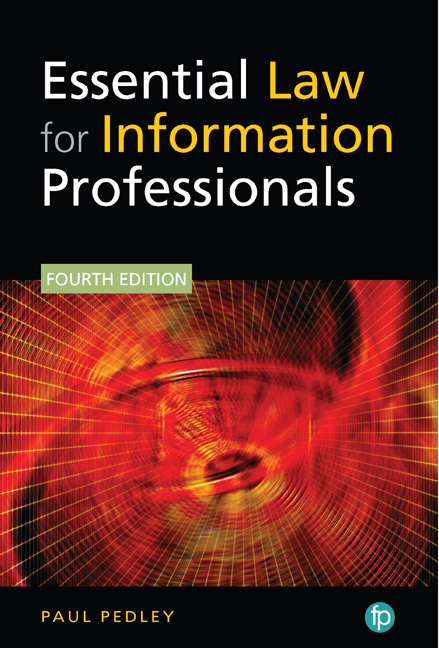Book contents
- Frontmatter
- Dedication
- Contents
- Disclaimer
- List of Figures and Tables
- Table of Statutes, Etc.
- Table of Cases
- Abbreviations
- Glossary of Terms
- Preface
- Chapter 1 General law and background
- Chapter 2 Library Law
- Chapter 3 Copyright
- Chapter 4 Legal Deposit
- Chapter 5 Breach of Confidence
- Chapter 6 Contracts and Licensing Agreements
- Chapter 7 Data Protection
- Chapter 8 Privacy
- Chapter 9 Freedom of Information
- Chapter 10 Human Rights
- Chapter 11 Re-use of Public Sector Information
- Chapter 12 Defamation
- Chapter 13 Professional Liability
- Chapter 14 Cybersecurity and Cybercrime
- Chapter 15 Disability Discrimination
- Chapter 16 Other Legal Issues Relevant to Librarians
- References
- Appendix 1 Brexit and the Orphan Works Exception
- Appendix 2 CILIP'S Ethical Framework
- Index
Chapter 16 - Other Legal Issues Relevant to Librarians
Published online by Cambridge University Press: 27 March 2020
- Frontmatter
- Dedication
- Contents
- Disclaimer
- List of Figures and Tables
- Table of Statutes, Etc.
- Table of Cases
- Abbreviations
- Glossary of Terms
- Preface
- Chapter 1 General law and background
- Chapter 2 Library Law
- Chapter 3 Copyright
- Chapter 4 Legal Deposit
- Chapter 5 Breach of Confidence
- Chapter 6 Contracts and Licensing Agreements
- Chapter 7 Data Protection
- Chapter 8 Privacy
- Chapter 9 Freedom of Information
- Chapter 10 Human Rights
- Chapter 11 Re-use of Public Sector Information
- Chapter 12 Defamation
- Chapter 13 Professional Liability
- Chapter 14 Cybersecurity and Cybercrime
- Chapter 15 Disability Discrimination
- Chapter 16 Other Legal Issues Relevant to Librarians
- References
- Appendix 1 Brexit and the Orphan Works Exception
- Appendix 2 CILIP'S Ethical Framework
- Index
Summary
Introduction
This chapter draws together the legal issues relevant to information profes - sionals which either don't fit neatly within existing chapters because they cover more than one area of law, or else are topics that a book of this kind ought to include but which don't warrant a chapter of their own.
Police, surveillance and libraries
In 2008, CILIP undertook a Survey on Police, Surveillance and Libraries (CILIP, 2008). The survey had been prompted as a result of CILIP receiving reports concerning increased police or other security agency activity.
Forty-one of the 55 libraries who responded to the survey mentioned a total of 134 incidents in the previous 18 months and these covered criminal activity, terrorism and pornography.
The survey found that 38% of respondents didn't have a formal policy for dealing with police requests and 13% only had a formal policy covering data protection issues. The survey also found evidence of five fishing expeditions.
As the survey found that some libraries did not have a formal policy in place for responding to police requests, this led to CILIP preparing a document entitled User Privacy in Libraries: guidelines for the reflective practitioner (CILIP, 2011).
In February 2011, the BBC News website ran a story ‘Snooping devices found in Cheshire library computers’ (BBC News, 2011) in which it said that police were investigating the discovery of snooping devices that were attached to public computers in two Cheshire libraries. Staff had found keystroke loggers – USB devices which record keyboard activity – on the back of two PCs, one at Wilmslow Library and another at Handforth Library.
In 2005, CILIP sought a legal opinion on ‘Rights of Access to Confidential Information’. Written by James Eadie QC of Blackstone Chambers, the legal opinion looked at the rights of the police and other security and intelligence services to demand access to confidential client information. The information in question will normally include names, addresses, other contact details and records of loans data (including borrowing, renewals, hold requests) and/or internet usage by individual library clients.
The police have had powers to apply to court for production and removal of, or access to, material held by private persons for many years. The relevant powers are contained in Part II of the Police and Criminal Evidence Act 1984 (PACE). The relevant features of that statutory regime are as follows.
- Type
- Chapter
- Information
- Essential Law for Information Professionals , pp. 319 - 336Publisher: FacetPrint publication year: 2019



